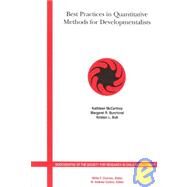Best Practices in Quantitative Methods for Developmentalists, Volume 71, Number 3
, by Bakeman, Roger; Gottman, John M.; Brewer, Denise; Bub, Kristen L.; Burchinal, Margaret; Graham, Frank Porter; McCartney, Kathleen- ISBN: 9781405169417 | 1405169419
- Cover: Paperback
- Copyright: 11/17/2006
The role of quantitative methods in testing developmentalhypotheses is widely recognized, yet even very experiencedquantitative researchers often lack the knowledge requiredfor good decision-making on methodology. The end result isa disconnect between research and practice in methods. Thepurpose of this monograph is to fill a gap in the literature byoffering a series of overviews on common data-analyticissues of particular interest to researchers in child development.Our hope is that this monograph will make alreadydeveloped methods accessible to developmentalists so theycan understand and use them in their research. We start atthe beginning with chapters on data management andmeasurement, two neglected topics in methods trainingdespite the fact that every investigation should begin withproper consideration of each. We follow with two importanttopics for developmental research, missing data and growthmodeling. Missing data can plague developmental workbecause participants sometimes miss one or more assessmentpoints. Growth modeling methods offer researchers atrue means to assess change over time as compared withcruder methods like difference scores and residualizedchange scores. Then comes a discussion of mediation andmoderation, two tools that can be used to elucidate developmentalprocesses. Because so much developmentalscience is non-experimental, we include a chapter on selectionbias that compares five modeling strategies. Proper attentionto data management, measurement, missing data, growthmodeling (whenever possible), mediation and moderation,and potential selection bias is guaranteed to result in greaterprecision in inference-making. Even when researchers makegood decisions about methods, it is critical for them to usegood judgment about the practical importance of findings,so we conclude with this important discussion. We view thismonograph as a first step to getting quantitative researchersstarted and we believe this reference will help researchersmake better-informed decisions about methodology.






